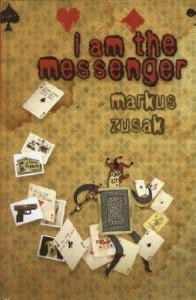Nineteen-year-old Ed Kennedy, a cabdriver in Australia, almost accidentally stops a bank robbery and nabs the would-be thief, thus achieving his Warholian fifteen minutes of fame. This would seem to be the high point in a life of mediocrity, but then a series of playing cards begin arriving in Ed’s mail, each with a set of coded, and increasingly difficult tasks he must perform. Will he manage to complete these tasks without injury to himself or his friends? What purpose is he serving in carrying out these tasks? And most importantly, who is responsible for these cards, and why are they sending them to him?
I came to this book after reading The Book Thief, and while I had issues with that book, I was very pleasantly surprised by I Am the Messenger, which is as different to TBT as you can imagine, although they are very similar in one very big way, but more about that later.

I found this book to be a real page-turner, and once I got into it (around p. 70) it was difficult to put down. Zusak has a real skill for creating mysterious situations with obvious solutions, but surprising you by having a completely unexpected solution. Whenever you think that the story is going in a predictable direction, or when you can’t imagine what Ed or some other character could possible do, Zusak pulls an unexpected, yet completely plausible, plot twist out of his hat. (I present the situation with Gavin Rose as a good example of this. Ed’s solution to this particular dilemma took me completely by surprise.)
A caveat to potential readers: Zusak packs his books with tiny details that seem unimportant when you read them, but have huge consequences for the story’s resolution. (J.K. Rowling is another author who does this.) As a result, there are quite a few details in those first forty or fifty pages that become very important later in the story. I found myself constantly going back and looking things up.
Recommendation: Recommended, but you have to pay attention. Ages: teen and YA (there are some descriptions of sexuality, rape, violence, and alcohol use that may be inappropriate for less mature readers).
A Few Thoughts of Zusak’s Writing Style
I originally wanted to talk about Zusak’s writing style, which I find at times exasperating and at other times intriguing. But I really think that I need to reread The Book Thief again first, and come back to this topic.
And Another Thing That Really Bugs Me
This book was originally published in Australia as The Messenger. Not I Am the Messenger. Just The Messenger. Book publishers do this a lot. As Markus Zusak would say,
I hate it when this happens.
Every single time.
Why do they do this?
Seriously, I want to know why they do this. Did Zusak’s US publishers think that potential readers would confuse his book with the woefully inadequate 1999 film also called The Messenger? J.K. Rowling’s US publisher, Scholastic, changed the name of the first Harry Potter book from Harry Potter and the Philosopher’s Stone to Harry Potter and the Sorcerer’s Stone. I have heard that they made this decision because they were afraid US readers would not be familiar with the philosopher’s stone, which you can look up in any encyclopedia, but this doesn’t explain why they would replace this expression with something that is completely made up.
I think part of the reason here is that US publishers are afraid that common readers will shy away from any book with the word “philosophy” in the title. (“Philosophy? Wasn’t that on Jeopardy or something? Where are the easy books?”) “The Messenger” just doesn’t make it clear enough, I suppose. It leaves too many questions unanswered, like who is the messenger? Never mind that most readers will figure this out sometime during the first fifty pages. US publishers are just afraid of making too demanding an intellectual task out of a book title.
At least with Zusak’s work, the publishers left Australian expressions intact. Most of Harry Potter’s British expressions have been converted to US equivalents, as in the case of “trainers” being changed to “sneakers,” Although they did less and less of this as the series was released in the United States. Apparently, they realized that kids could get it, did get it, and would continue to get it. Readers, especially kids, are smarter than publishers seem to think.
Zusak, Markus. I Am the Messenger. New York: Alfred A. Knopf, 2005. (Originally published in Australia in 2002 as The Messenger.)

https://bookblog.kjodle.net/2010/07/27/i-am-the-messenger-markus-zusak/
